Ali Darwish | Hassan Ibrahim | Hani Karazi
Donald Trump’s return to the White House signals a potentially different old-new policy for countries worldwide, in contrast to his predecessor, President Joe Biden. Europe, China, Russia, the Middle East, and even neighboring Mexico experienced a more heated American engagement on various issues during Trump’s first term from 2016 to 2020.
The most notable memory for Syrians regarding Trump is his military strike against regime forces and referring to Bashar al-Assad as an “animal” due to the regime’s use of chemical weapons against civilians in Khan Sheikhoun, south Idlib, in April 2017.
Trump’s policies during his first term reflected on various levels, owing to his dealings with influential actors in the Syrian file, primarily Iran and Turkey. He also signed the US Caesar Act to protect civilians.
Since Trump’s victory over his Democratic rival Kamala Harris, influential countries involved in the Syrian file have started to formulate their policies based on their previous experiences with Trump during his first presidency. The Syrian lobby in the United States also plans to intensify its efforts to pressure the regime.
Unpredictable new policy…. Continuation of old policy
Trump’s policy towards Syria and the region remains challenging to analyze and predict. “Trump is a person whose thoughts are hard to guess,” as expressed by Dr. Samir Alabdullah, Director of Policy Analysis at the Harmoon Center for Contemporary Studies.
Alabdullah stated to Enab Baladi, that compared to Trump’s previous presidency, “I think the situation is different now.” The region is witnessing significant escalation and ongoing war for over a year, so his response will likely be different this time, expected to be harsher.
This can be inferred from the names announced as part of his team, most of whom have stringent positions against the Assad regime and Iran.
Qutaiba Idlbi, Director of the Syrian Program at the Atlantic Council (a US think tank), responded to Enab Baladi‘s question about Biden’s declining interest in the Syrian file compared to Trump, stating that the officials managing the Syrian file during Trump’s time were more invested in it.
However, Trump is unlikely to show a different interest in Syria; the essential question today is who the individuals will be occupying the positions managing the Syrian file and the region in general. Based on that, we can gauge the attention that might be directed at the Syrian file, “for now, this matter is unclear,” said Idlbi.
Trump has nominated three individuals from his team at the time of preparing this report: Tulsi Gabbard, for the position of Director of National Intelligence, who had met with the regime’s leader Bashar al-Assad on a “fact-finding mission” in 2017.
Trump has chosen real estate investor and owner Steve Witkoff, founder of the Witkoff Group, as a special US envoy to the Middle East, while he looks to appoint Mike Waltz as National Security Advisor at the White House, who is a veteran special forces operator.
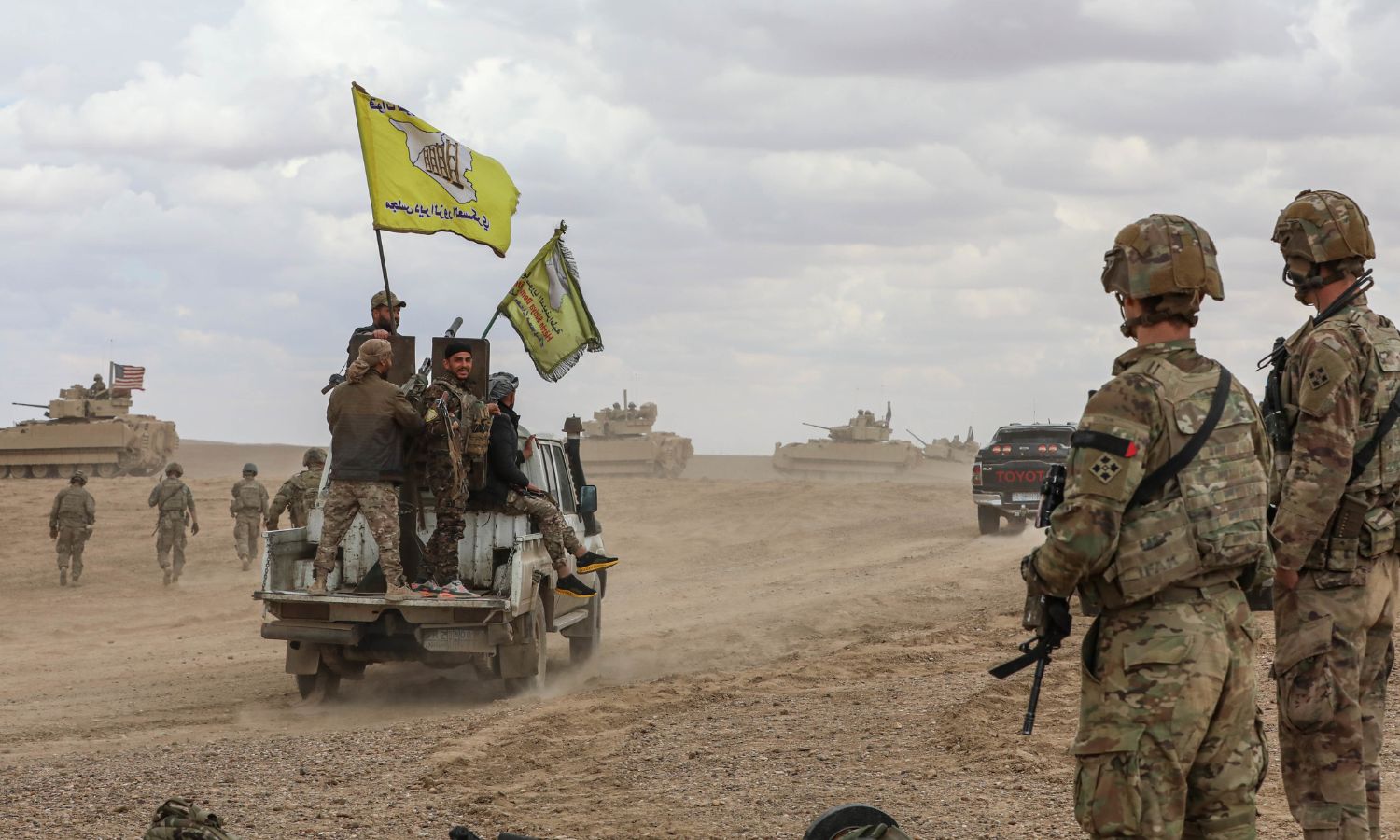
Syrian Democratic Forces conduct live ammunition exercises alongside US soldiers in Syria – September 2022 (William Gore/US Army)
Connection to US policy
Qutaiba Idlbi clarified that the United States’ strategy regarding Syria practically entails continuity. Since 2015, US strategy has evolved to focus on essential factors in Syria, which include:
- Reaching a ceasefire.
- Combating “terrorist” groups within Syria.
- Containing Syria’s crises, especially the refugee issue, to avoid its impact on western countries.
- Transitioning from a regime-change policy to a reconciliation process between the regime and the opposition.
This strategy has not changed since 2015; however, what has varied over different periods is the execution method. Trump’s team focuses on pressuring Iran or achieving these goals through a “maximum pressure” campaign.
Practically, the same strategy has continued during Biden’s presidency, which involved more diplomacy by working with regional actors (he lifted pressure on the regime), whereas with Trump, we will see a return to maximum pressure policy against the regime. Thus, “I believe the situation will certainly not be good for the regime,” as expressed by Idlbi.
Opposition needs reorganization
Dr. Samir Alabdullah ruled out that the Syrian opposition, in its current state, would receive “any consideration from the United States or other countries,” especially as it has become detached from the opposing public sentiment.
However, regarding the opposition-controlled areas, Alabdullah suggested that the United States is likely to continue supporting humanitarian aid efforts, and there might be an agreement on seriously thinking about a political solution or achieving progress in political tracks, especially if Trump and Putin come to an agreement, which will reflect on all of Syria.
The opposition needs to reorganize and present itself to be included in the considerations of Trump’s administration, and in its current form, “non-international actors do not have strong chances today,” according to Idlbi’s words, whether in Washington with Trump’s administration or elsewhere.
Files on the table
The Syrian file is linked to several regional and international issues, including the war waged by Israel against Gaza and Lebanon and its strikes inside Syria, the Syrian refugee crisis, and drug trafficking operations.
According to Qutaiba Idlbi, for the United States, the primary file is mainly related to Israel and how to stop the supply line coming through Syria to Hezbollah, which is very important for Israel. “I believe a way to address this will be proposed in the early months as part of managing the region’s files and the existing chaos today.”
Another file that has been discussed is the withdrawal from the border area between Syria and Turkey, something that Trump and his team are still talking about.
Idlbi noted that when Trump talks about withdrawal, he does not mean a complete withdrawal from Syria, but rather from the northern M4 area, practically ensuring that the US is not the defensive line for the Syrian Democratic Forces (SDF) against any Turkish attacks. “Of course, we will see developments regarding this during the coming year.”
The other important file is the sanctions file, as Syria will witness increased tightening regarding the implementation of sanctions programs, especially the Caesar Act, and there is no doubt that the Assad Regime Anti-Normalization Act will be passed next year, given the control of Republicans over aspects of legislative and executive decision-making.
Russia… No change
In an interview with the Russian news agency RIA Novosti, Alexander Lavrentiev, the Russian president’s special envoy to Syria, announced that his country is ready to resume dialogue with Washington regarding Syria when Trump returns to the White House, and that if there are suggestions, the Russian side is open.
Russia holds significant influence at various levels in Syria after its intervention alongside the regime in September 2015, which opened broader avenues for it in the economy and military control in Syria.
Russian affairs expert Dr. Nasr al-Youssef ruled out any change regarding Russia’s influence and control in Syria after Trump’s return to the White House, stating that “this matter will not be a subject of debate or argument between the two leaders.”
Al-Youssef told Enab Baladi that if Russia wants to expand its control and influence in Syria, Iran will not pose a hindrance, and the current situation is very favorable for Russia. “I am confident it can pass anything it wants.”
Al-Youssef indicated that both the regime and Iran are entirely indebted to Russia; Iran cannot forget that it was unable to halt the advance of the former Free Syrian Army factions in 2015, which led the Iranians to seek Russia’s assistance, which is evident on a domestic level.
Internationally, Russia acts as Iran’s lawyer on the global stage, particularly in the Security Council; Iran cannot, and does not wish to, be an obstacle to Russian expansion, on one hand.
On the other hand, according to al-Youssef, Russia is not looking to expand more than it already is in Syria; its presence in what is called “useful Syria” is currently “very good,” and Russia can also dictate the relationship it desires in Syria with Israel due to their friendship. Despite the deterioration in relations between Putin and Netanyahu, analysts have stated that “respect still exists.”
Qutaiba Idlbi agrees with Nasr al-Youssef that Russia’s influence will not be affected by Trump’s return, indicating that the first file on the agenda between the US and Russia will be Ukraine, and reaching a solution in Ukraine will take some time to reach the form agreed upon by the two countries.
The Syrian file is “secondary for both countries,” and before discussing Syria, the two parties will talk about Ukraine, relations with China, Iran, and North Korea, “so I honestly do not know if there is any capacity for either administration to even have enough time to address the Syrian file in the coming phase,” according to Idlbi’s statement.
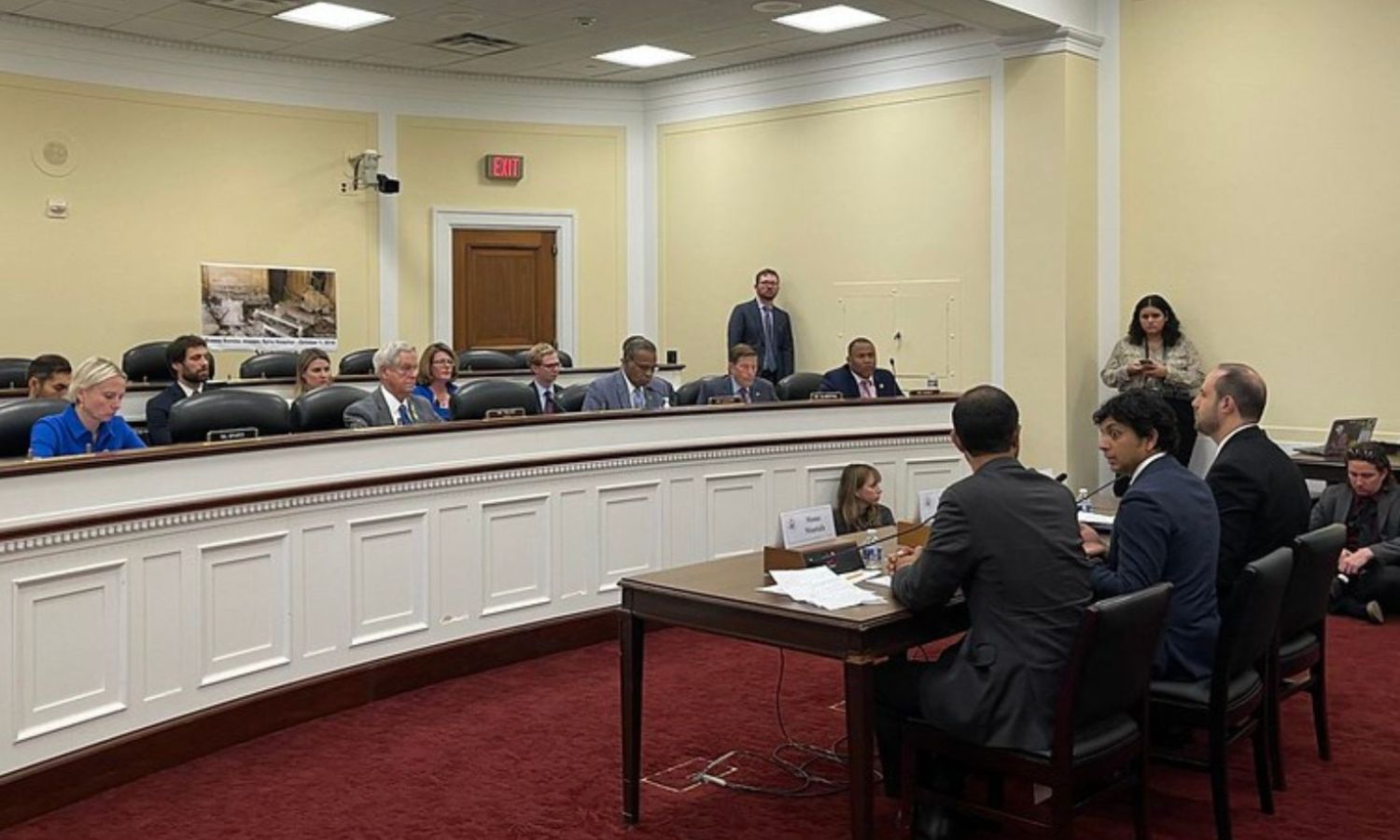
From the congressional hearing to revive the Assad Regime Anti-Normalization Act – July 10, 2024 (Mohammed Ghanem – X)
Turkey is optimistic… SDF is anticipating… Attention turns to Iran
The threads and parties of the military file in Syria are intertwined, involving local factions and entities or regional and international forces whose interests intersect and conflict within the country. The United States has been and remains a key player in altering control dynamics, whether through its support for factions with weapons and then abandoning them later, or through military presence, or aligning its interests with other powers, or granting the green light for operations and strikes by other entities.
Intentions for US withdrawal from Syria
US forces first entered northeastern Syria in 2014 with the mission of combating the Islamic State, supporting the Kurdish People’s Protection Units (SDF currently) and coordinating with them in that mission.
To this day, the United States retains about 900 soldiers in Syria, in military bases like the al-Omar oil field, al-Shaddadi, and al-Tanf, despite various withdrawal intentions, the most prominent of which was at the end of 2023, when the US Senate overwhelmingly rejected a resolution calling on President Biden’s administration to withdraw.
During his first term, Trump announced in 2018 that he would withdraw US forces from all Syrian territories, considering that they had achieved their goal of inflicting a “defeat” on the Islamic State.
With his return to the presidency, this file quickly moved. Robert Kennedy Jr., a close ally of Trump, stated that Trump expressed intentions regarding the withdrawal of forces from northeastern Syria during a flight, asserting that US forces would not be “cannon fodder” in the event of fighting among the conflicting parties in Syria.
Swedish fellow researcher specializing in Syrian affairs at the Century International Center, Aron Lund, believes that all possibilities are open and that it is likely that troops will be withdrawn, but this could occur in many different ways.
Lund believes that Trump’s win in the elections increased the chance of a unilateral US withdrawal from Syria compared to what would have occurred had Harris won, but there was also a possibility that Harris might have withdrawn as well, and there is a possibility that Trump could maintain troops in Syria.
Turkey will rely on the relationship between Erdoğan and Trump as there may be a “good relationship” between them; Trump is naturally inclined to deal with influential and strong leadership rather than weak parties or countries, according to Turkish analyst Firas Ridwanoglu.
Ridwanoglu explained to Enab Baladi that Turkey thinks of strengthening its relationship with Trump to present the Kurdish separation issue in northern Syria as a dangerous matter that does not suit the Turkish military ally, and that Turkey may eventually find itself changing its policy over time if the situation remains as it is.
On the other hand, Israel seeks to exploit the Kurds and is currently at odds with Turkey due to Gaza, which will create conflict between the two parties.
Russia is also an important player in Syria; thus, there will be significant Turkish-Russian-Israeli competition in Syria or in northern Syria to some extent, which adds complexity to the conflict. Trump, being a strong figure, may make sudden decisions that will affect the situation, according to Ridwanoglu.
Complex factors
Swedish fellow researcher specializing in Syrian affairs at the Century International Center
Harris would, most likely, have continued Biden’s policy, which was basically about trying to ensure stability and not causing any form of disruption. That involved keeping troops in Syria, simply because no better option appeared to be on the table.
It is worth noting, however, that the Biden administration has negotiated an agreement with Iraq to withdraw forces from that country over the next two years. Now, I believe that the US-Iraq agreement is probably vague enough to enable some form of continued US role, especially in northern Iraq. If not, however, it could mean the end of the Syria deployment as well. It is very unlikely that the United States would keep that number of personnel in Syria without a secure logistics route through Iraq. How that process would have played out under a president Harris, we’ll never know.
Trump has repeatedly signaled his desire to withdraw the troops from Syria. He tried to do so several times during his first presidency. These attempts were all thwarted by Trump’s own poor planning and by bureaucratic and military inertia, as well as by the simple fact that a withdrawal was likely to have ugly, unpopular political effects that he did not want to bear.
Trump has not formulated a clear policy on Syria for his second term, and most likely he does not have a plan at all. Judging by remarks from Robert F. Kennedy Jr., he still wants the troops out. Whether that will translate into an actual full-scale withdrawal—and if so, when or how remains to be seen.
There are a lot of complicating factors, however. The Middle East is in a crisis, and Trump may be advised to keep troops there so as not to cause new unrest while he’s trying to solve problems in other places. He will also probably be wary of appearing weak or of giving free concessions to Iran, and people will tell him that leaving Syria will have that effect.
Biden’s debacle in Afghanistan may also caution him against a hasty withdrawal.
Many of the people who are likely to have influence over Middle East policy in his second term belong to a hard pro-Israel, anti-Iran trend in US politics, and they will surely want the troops to stay as leverage against Iran. But there are some notable exceptions, like his pick for Director of National Intelligence, Tulsi Gabbard, and the vice president, J. D. Vance. We also know that Turkey is likely to push Trump to withdraw, as happened last time. In any case, it’s ultimately up to Trump. The US constitution accords the presidency such powers that it will effectively be a one-man decision.
Will Washington stop supporting the SDF?
Turkish-US consensus in Syria
With Trump’s arrival to presidency, Turkey’s interest in enhancing relations with Washington became clear, especially regarding the Syrian file, which has not seen complete agreement between them for years, as the US supports the Syrian Democratic Forces (SDF) and considers them a partner in fighting the Islamic State, while Ankara views the SDF as terrorist and an extension of the Kurdistan Workers’ Party (PKK).
Trump’s return has reignited Turkey’s demands on Washington, placing them back at the forefront, especially after Turkish President Recep Tayyip Erdoğan spoke about his contact with Trump and the desire to renew cooperation between the two sides, focusing Turkish demands on ending US support for the People’s Protection Units (YPG), the military backbone of the SDF, and discussing a potential withdrawal of US forces from Syria.
On November 8 and 10, Erdoğan vowed to complete the establishment of a security belt along Turkey’s southern border, stretching 30 to 40 kilometers, in reference to the Syrian-Turkish border where the SDF controls parts of it.
US support for the SDF did not prevent Ankara from launching military operations in northern Syria, some of which were carried out with a green light from Washington. Turkey has conducted three operations in collaboration with the Syrian National Army namely Euphrates Shield in 2016, Olive Branch in 2018, and Peace Spring in 2019, occasionally threatening to launch more operations.
For example, after Washington warned of the repercussions of the Peace Spring operation (which included Tal Abyad and Ras al-Ain) and stated that the operation jeopardizes the fight against the Islamic State and puts civilians and regional security at risk, Ankara and Washington agreed on a temporary ceasefire in northeastern Syria, pending the withdrawal of the People’s Protection Units from the region at that time.
The joint statement (Turkish-American) carried 13 points, under which Washington lifted the sanctions it was about to impose on Turkey due to the military operation.
Turkish foreign policy and security expert Ömer Özkizilcik stated to Enab Baladi that under the new circumstances, Turkey’s goal of combating “terrorism” aligns with the US desire to limit Iranian influence in Syria, making an agreement between Trump and Erdoğan seem possible.
Özkizilcik mentioned that alongside the US military presence, there are Shia militias supported by Iran and the Iranian Revolutionary Guard Corps (IRGC) to the southwest of the Euphrates and to the south and east across Iraq. The moment the United States withdraws from Syria, Iran will fill that gap, and because of this “clear and simple fact,” Trump faces three options:
- Continue to stay in Syria.
- Withdraw from Syria and leave the region to Iran, jeopardizing Israel’s security.
- Reach an agreement with Turkey, allowing Turkish forces to enter the area first, then withdraw US forces from Syria.
Regarding the factors that may lead the United States to respond to or reject Turkish demands (not supporting the People’s Protection Units, withdrawing from Syria), Özkizilcik believes it depends on whether Turkey and the US can find a way for greater cooperation, as well as on Trump’s ability to make and implement decisions, noting that Trump’s plan for withdrawal from Syria had not previously materialized as he had desired.
According to a report from 2023 by the American Hudson Institute research center, prepared by Özkizilcik along with his colleague at the center Michael Doran, a former member of the US National Security Council, it included steps for successfully uniting Turkish and American spheres of influence in Syria and revitalizing their partnership relations.
The steps included: evacuating the YPG from Deir Ezzor areas in northeastern Syria by separating the Deir Ezzor Military Council from the SDF, evacuating the YPG from al-Hasakah province, engaging Russia to avoid confrontation, cutting the Iranian supply route, and cleansing Idlib by working on solving the Hayat Tahrir al-Sham (HTS) by Ankara and Washington.
The SDF awaits a different policy
After Trump’s victory announcement, the Autonomous Administration, the political umbrella for the SDF, issued a statement congratulating Trump and expressing its hope for a “leading role that contributes to achieving stability, enhances counter-terrorism efforts, and limits efforts threatening regional and international security.”
The co-chair of the Autonomous Administration, Hamdan al-Abd, stated that the administration has other allies such as Russia and other European countries, considering that the US withdrawal from northeastern Syria would lead to an expansion of Iranian and Russian influence in the region.
The researcher specializing in northeastern Syria at the Omran Center for Strategic Studies, Osama Sheikh Ali, believes that the return of Trump, whom the Autonomous Administration considers to have a bad history with, without the presence of someone like Brett McGurk (who was the architect of the relationship between the Autonomous Administration and the US administrations), could be seen by the administration as a problem it will face in the future.
Sheikh Ali stated that all stakeholders in the region are aware that Trump is a “deal maker,” meaning he does not want to come out losing or give something without a counter, which means that the anxiety regarding his return is not confined only to the Autonomous Administration, but can be considered a concern for all parties regarding this return.
“More likely to respond forcefully to Iran”
During his first presidential term, Trump followed a “maximum pressure” policy towards Iran, withdrawing from the nuclear agreement with Tehran, reimposing strict sanctions, and ordering the killing of the Iranian Quds Force commander, Qassem Soleimani (January 2020).
He also indicated during his election campaign a readiness to escalate tensions with Tehran, especially after US allegations of its involvement in assassination attempts against US figures, which were met by an official Iranian denial of any involvement in the assassination plots, sparking discussions and questions about his new approach to Iran and its proxies in Syria.
Saba Abdul Latif, a research assistant at the Omran Center for Strategic Studies, said that Trump’s return to the White House “will not have a positive effect, of course” on Iran’s influence in Syria, considering Trump’s policy towards Iran somewhat clear, given his previous term and the mechanism of his negative dealings with Iran.
Abdul Latif added to Enab Baladi that Iran was one of Trump’s key files, and he worked to curb and contain it. If he follows the same approach in his current term, especially with regional changes, Iran will not be in a good position internationally and domestically, especially after losing its most important tool in the Middle East, the Lebanese Hezbollah.
Iran will need time to rebuild the internal structure of its affiliated organizations, which will take a significant amount of time, and Trump will not give it this time, considering the potential to open new fronts diplomatically and possibly even militarily in Syria.
Abdul Latif emphasized that Trump’s return would be a fundamental threat to Iran’s existence in Syria, considering it as a potential future front and, on the other hand, the last stronghold that hosts extensive Iranian forces.
The shape of pressure on Iran may vary, as it could be political, diplomatic, in the form of sanctions, new alliances, or military actions and support, with “Trump failing to exploit Iran’s current weak situation in the region being an unlikely scenario,” according to Abdul Latif.
In the Syrian arena, US bases carry out multiple tasks, with one of their key objectives being to prevent Iran from establishing a land corridor through Iraqi territory or more (from Iran to the Mediterranean coast in Syria and Lebanon), to deprive it of a supply line to armed groups that could pose a dual threat to both US allies, Jordan and Israel.
As of mid-2024, the number of Iranian military sites in Syria has reached 529, making it the largest foreign force presence in Syria.
Over the past year, there have been repeated attacks on US bases by Iran-backed militias, which Washington considers attempts to force it to withdraw its forces from the region, as these bases form the first line of defense for Israel.
In response, US forces retaliated to these attacks, the latest being on November 11, when US warplanes targeted sites belonging to Iran-backed groups in Deir Ezzor province in eastern Syria.
Researcher Aron Lund believes that Trump would be more inclined to retaliate aggressively against attacks on US forces by pro-Iran militias and others. That could set its own dynamics in motion, with unpredictable effects on Syria policy.
Lund noted that it is possible that Trump will be less willing to withdraw if it seems that the United States is chased out as a defeated force. On the other hand, ongoing harassment of US forces may rekindle Trump’s frustration with Syria, which he previously described as a place of “sand and death,” convincing him that there is no benefit in staying.
According to Dr. Samir Alabdullah, Trump is a man of finance and economy, and an all-out war with Iran will not be his choice. However, if Iran or the Assad regime makes any misstep, Trump will not be forgiving this time, as he previously regretted not striking the Assad regime, and his current team is hardline on this file.
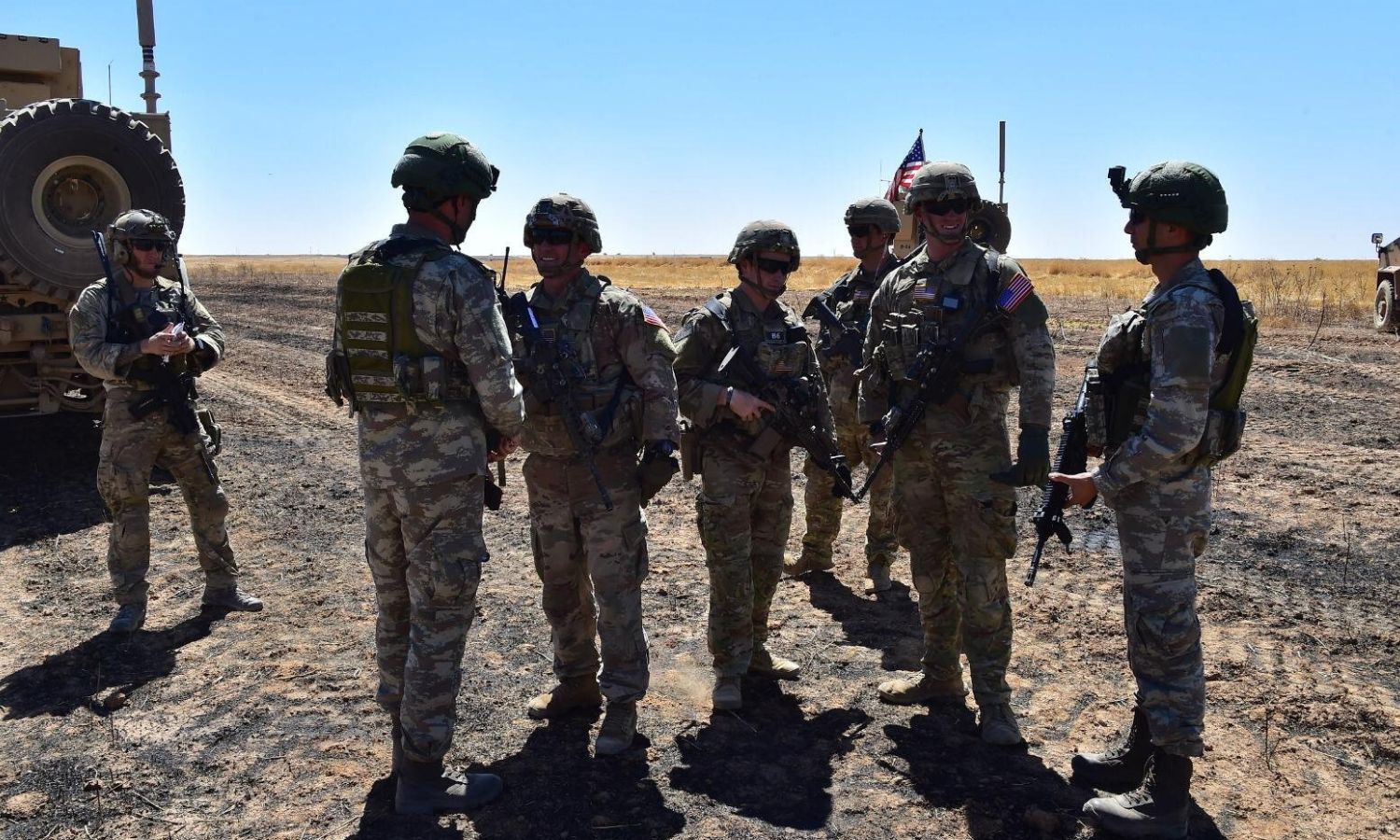
The first Turkish-American joint military patrol in northeastern Syria – September 8, 2019 (Turkish Ministry of Defense)
The Syrian lobby.. Intensifying activities
Syrian organizations in the United States are pressuring the new US administration to pass laws and make effective decisions regarding the Syrian file, and this work began months before the elections through meetings with the campaigns of presidential candidates, Trump and his Democratic rival Kamala Harris.
There is a wide Syrian lobby in the United States, comprising civil society organizations, businessmen, opinion leaders, and Syrian politicians who have obtained American citizenship, continuously raising issues concerning Syria in Congress.
Following Trump’s official election victory, the focus of the Syrian American lobby shifted towards engaging with Trump and his team expected to handle the Syrian file, as Syrian organizations in the United States prepared a list of agendas they aim to follow up on to be officially passed in favor of the Syrian people.
A direct Syrian meeting with Trump
Weeks before the US elections held on November 5, the President of the Citizens for a Safe America organization, George Astifo, along with several members of the organization, met with Trump to discuss issues related to the Syrian file.
Regarding the details of this meeting, member of Citizens for a Safe America, Bakr Ghbeis, stated that the meeting lasted over an hour, during which they reminded Trump of his prominent positions in Syria during his first presidential term, emphasizing their call for him to continue the same approach in his second term regarding Syria.
Among Trump’s notable positions were his contribution to stopping the regime’s potential attack on Idlib, his killing of Qassem Soleimani, his bombing of the Shayrat airport in Homs as punishment for Bashar al-Assad for targeting the town of Khan Sheikhoun with chemical weapons, and his signing of the Caesar Act.
The organization stressed during its meeting with Trump the importance of facilitating direct communication between Syrian actors in the United States and his transition team and the team specialized in US policy in the Middle East.
Ghbeis added to Enab Baladi that Trump reaffirmed that al-Assad is “an animal and a criminal for killing Syrians,” insisting that he is the only US president who punished al-Assad for crossing the red line, and that Joe Biden’s policy towards Syria and the Arab region has contributed to the normalization of countries’ relations with al-Assad.
Four files in the lobby’s basket
Dr. Bakr Ghbeis believes that Syrian organizations in the United States have four priorities they seek to work on with the new US administration. The first is to push for the Syrian file to be one of the priorities in Trump’s Middle East policy.
The second file is to work on stopping the normalization process with the Syrian regime by attempting to pass the Assad Regime Anti-Normalization Act, which was obstructed by Biden in April, in addition to working to ensure the extension of the Caesar Act for as long as possible.
The third file is to pressure the US administration to fully end the Iranian presence in Syria, in all its forms: military, demographic, and social, which leads to ending the hegemony of the Lebanese Hezbollah.
The fourth file is to secure economic and humanitarian support for the Syrians in northern Syria to help them stabilize and build the state and society, aiming to curb the reasons for migration by establishing projects that help create jobs and improve the economic and service situation, according to Ghbeis.
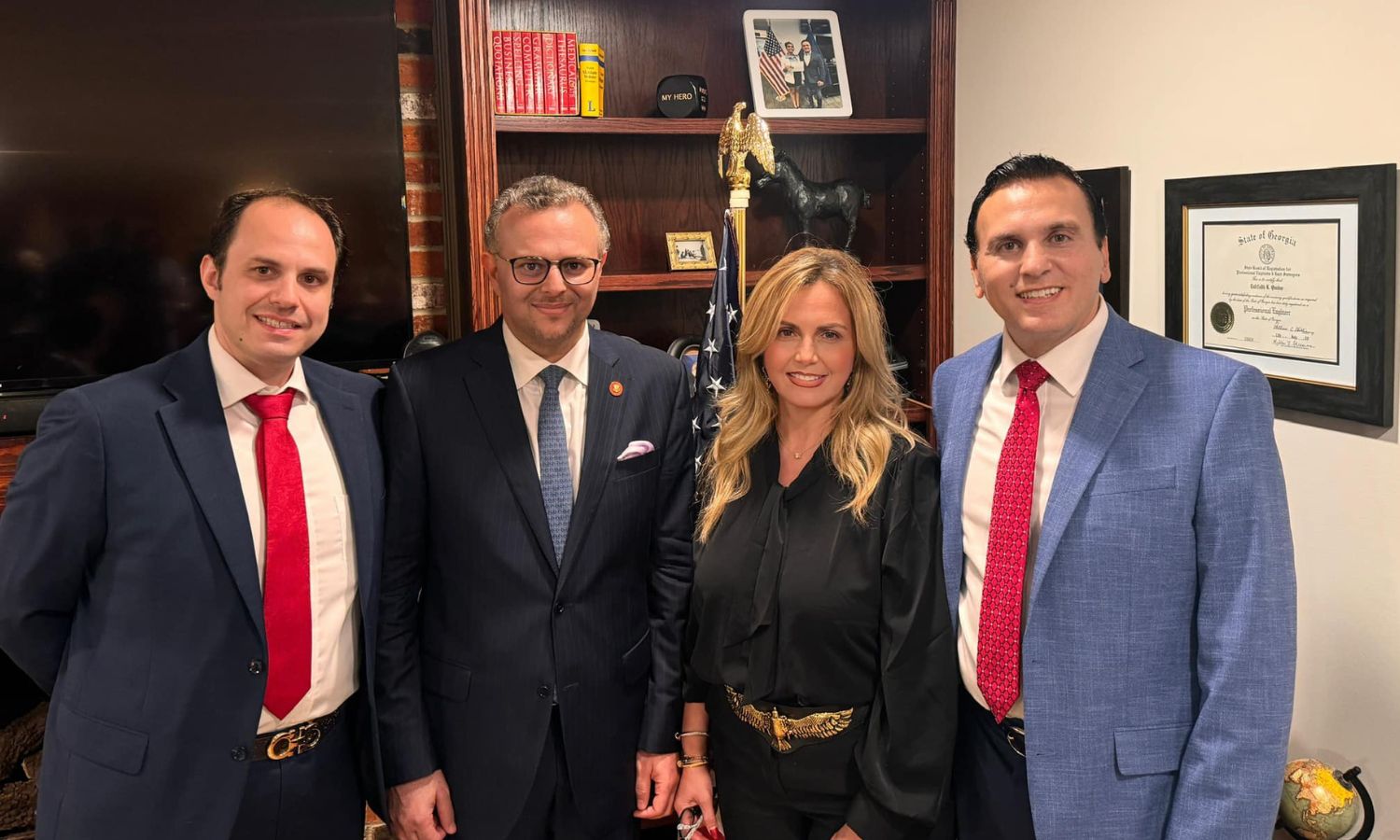
Farah al-Atassi, President of the Arab American Center, and other figures alongside Massad Boulos, the father of Trump’s son-in-law – November 10, 2024 (Farah al-Atassi)
Tightening the noose through the Caesar Act
The executive director of the Syrian Emergency Task Force, Mouaz Moustafa, stated that the Syrian lobby in the United States continues negotiations with Congress through meetings with both Democratic and Republican deputies, in addition to communication with Democratic Senator Ben Cardin’s office, who obstructed the Anti-Normalization Act, to pass as many laws as possible for Syria, led by the Caesar Act, which is now just a step away from extension.
Moustafa added to Enab Baladi, “This year we aimed to include the issue of withdrawing US recognition of the Syrian regime within the package of laws that Congress would vote on, but we failed due to Senator Cardin incorporating amendments into the Assad Regime Anti-Normalization Act and deleting others, which weakened it.”
He indicated that the Syrian lobby will pressure again next year to pass the clause on withdrawing US recognition of the regime, which would have significant repercussions for al-Assad.
Reaffirming the importance of the Caesar Act on the ground, the Trump administration imposed sanctions on 113 intermediaries of the regime in the six months following the enactment of the Caesar Act in June 2020.
Syrian political activist in Washington, Mohammed Ghanem, feels that some countries are pressuring to obstruct the renewal of the Caesar Act, “but we seek to renew the law for six years instead of four, and at the same time we wait to see who will be responsible for affairs in the Near East in the State Department, and whether a special envoy for Syrian affairs will be appointed, as this position was abolished during Biden’s term in order to work on other laws for the benefit of the Syrian people.
In this context, Syrian-American media and political figure Ayman Abdul Nour stated to Enab Baladi that the Caesar Act achieved many goals; had the law not existed, for example, some Gulf countries would have deposited financial amounts worth five billion dollars in the Syrian Central Bank, as they did in Turkey and Egypt, contributing to reviving the collapsing regime’s economy, and European countries would have reopened their embassies with the regime and opened the doors to trade with it.
Abdul Nour added that the existence of the Caesar Act prevented the regime from strengthening its military capabilities in ammunition and weapons, keeping its army weak and incapable of opening any battles in northeastern or northwestern Syria, pointing out that despite the law’s powerful implications, it needed development, hence the introduction of the Anti-Normalization Act.
Cautious optimism
Following Trump’s victory in the US presidency, a sense of cautious optimism prevailed among the Syrian lobby in the United States, believing it might seek to impose a new agenda in Syria, different from what his predecessor Biden had done, which contributed to enhancing al-Assad and Iran’s influence. However, some Syrians have expressed concern over potential obstacles that may arise in Trump’s second term regarding Syria.
In this context, Ghanem mentioned that Trump’s victory will help in enacting the Anti-Normalization Act, especially since the original sponsor of the project, Republican Senator Jim Risch, will become the Chair of the Senate Foreign Relations Committee, replacing Democratic Senator Ben Cardin, who played a significant role in obstructing the Assad Regime Anti-Normalization Act.
Senator Jim Risch has a strong animosity towards al-Assad and Iran; following al-Assad’s return to the Arab League in May 2023, Risch stated, “The return of Bashar al-Assad to the Arab League must be condemned. Syrians deserve to hold al-Assad accountable, not take pictures with him.”
On November 13, Risch stated that the Republican party will restore Iran to its pariah status.
Ghanem added that the appointment of Senator Marco Rubio as Secretary of State was good news for Syrians, “as he is the second sponsor of the law against normalization with al-Assad, and we have worked with him for a long time, having a hardline position against al-Assad.” Therefore, the chances of enacting the law during Trump’s time will increase, especially after the Republicans controlled Congress in both the House of Representatives and the Senate.
Not without risks
While some indications have emerged that encourage optimism regarding the Syrian file after Trump’s election win, at the same time, there are certain challenges that could have a negative impact on the scene in Syria in favor of the Assad regime.
Ghanem noted that some figures close to Trump might play a role in obstructing the Assad Regime Anti-Normalization Act, including Tulsi Gabbard, who has become the Director of National Intelligence, having met al-Assad in Damascus in 2017, a few days before Trump took office for the first time, and criticized the Syrian opposition, refusing to acknowledge that the Syrian regime had used chemical weapons. He noted that some officials surrounding Trump do not want the United States to intervene too much in Syria.
In 2019, Gabbard stated that al-Assad “is not an enemy of the United States,” reasoning that Syria does not pose a “direct threat” to the United States, and she refused to describe Bashar al-Assad as a “war criminal,” contrary to her later statement calling him a “dictator.”
Ghanem pointed out that some countries that normalized relations with the regime are attempting to pressure Washington and influence its decision. At the same time, there are other negotiations being conducted by several countries (not named) to convince the United States to reward Bashar al-Assad, who distanced himself from the conflict occurring in the region with Israel, adding, “There are matters that benefit the Syrians and some against them concerning the US position, as the war is a contest.”
if you think the article contain wrong information or you have additional details Send Correction
النسخة العربية من المقال
-
Follow us :













 The newly elected US president, Donald Trump, alongside Syrian regime leader Bashar al-Assad, Turkish President Recep Tayyip Erdoğan, and Iranian President Masoud Bezhkian (Modified by Enab Baladi)
The newly elected US president, Donald Trump, alongside Syrian regime leader Bashar al-Assad, Turkish President Recep Tayyip Erdoğan, and Iranian President Masoud Bezhkian (Modified by Enab Baladi)





 A
A
A
A
A
A
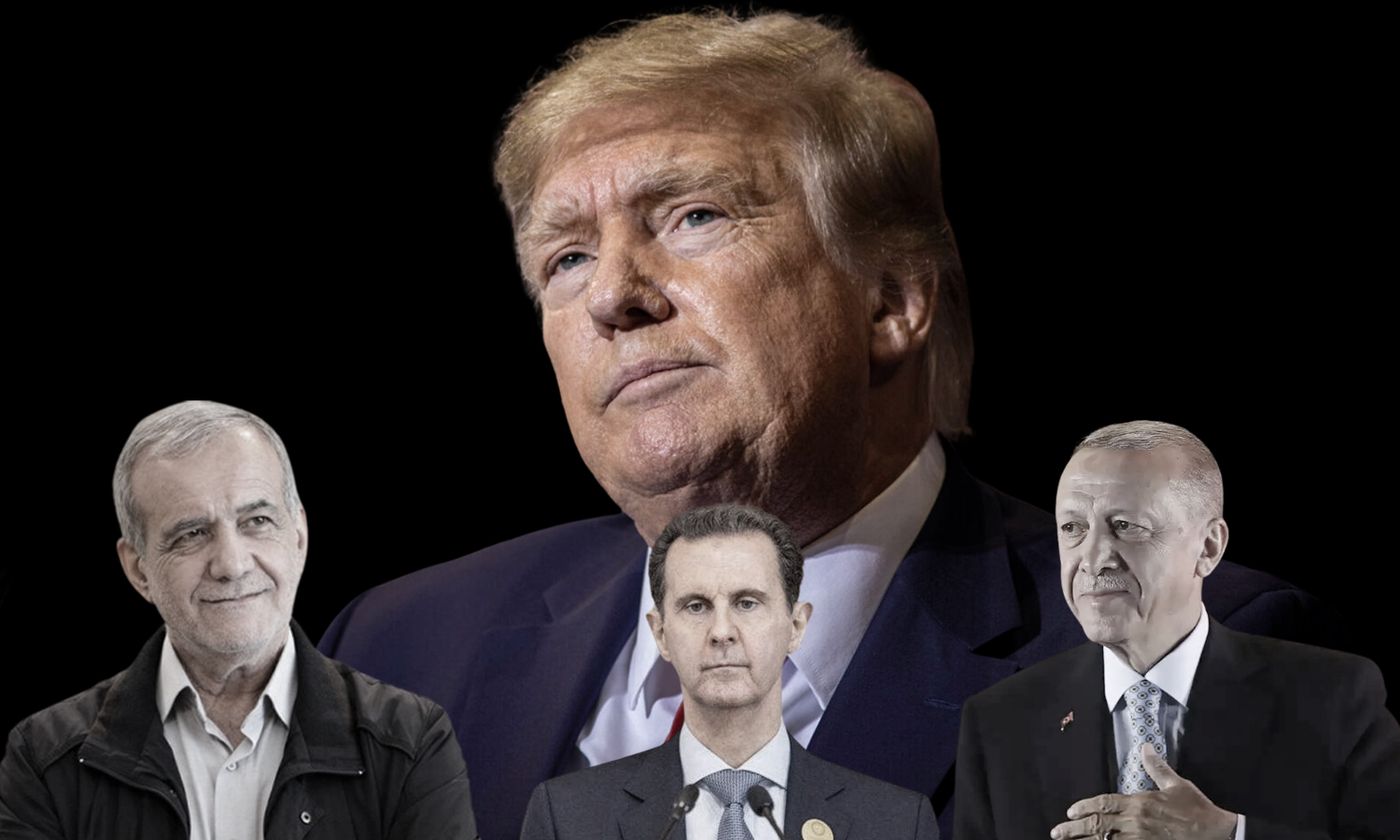




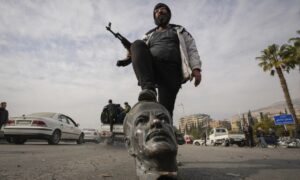
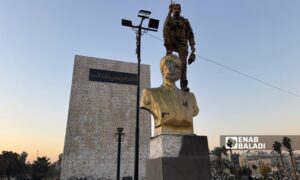
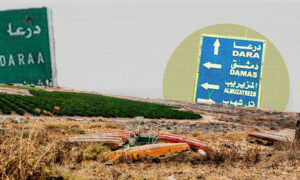

 More In-Depth
More In-Depth